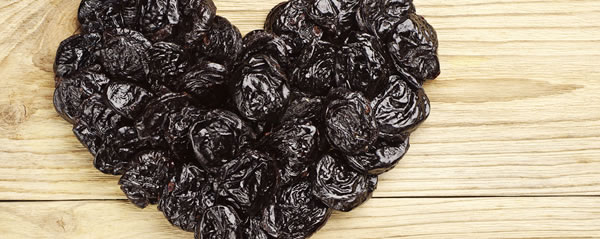1. Prevent constipation

This is arguably prune juice’s best known benefit – helping to counter constipation. But what makes this particular fruit so good at helping your bowel move along efficiently?
Firstly, prunes are high in dietary fibre. This creates the roughage that helps spur your gut contractions along; however, many fruits and vegetables contain fibre, so what makes prunes so unique? Importantly prunes, and their juice, also contain sorbitol which is a type of indigestible carbohydrate that is particularly abundant in stone fruits; again this ingredient helps to move things along internally. Finally, prunes contain an ingredient called diphenyl isatin. This component helpfully acts as a natural laxative which means this impressive trio of ingredients make prunes, and their juice, pretty effective for helping us go to the loo more regularly.
Top tip: Gently warm prune juice for some extra digestive power. This deliciously sweet ingredient is also a suitable option for children who aren’t able to take certain over-the-counter medications.
2. Minimise haemorrhoids
Whilst people, understandably, often want a quick fix when it comes to relieving the uncomfortable symptoms of haemorrhoids, it can be helpful to try and understand what the underlying cause may be.
Haemorrhoids are actually a form of varicose vein which form in and around the anus. Varicose veins may occur as a result of an increase in fluid volume in your body, for example during pregnancy, but more commonly, as a result of excess pressure in the area or ‘straining’ when on the loo. As a result of this, we can identify constipation as a common cause of this troublesome ailment.
Therefore, achieving softer stools, and/or more regular bowel movements are important steps for helping to improve the symptoms of haemorrhoids, and this is where prune juice comes in. Not only is it providing a source of liquid to help keep you hydrated and stools soft, it also contains some vital fibre-like components, as mentioned above, to help shift a sluggish bowel.
3. Support bones in the menopause

The drop off in oestrogen levels during menopause can often be a cause for concern for any of us who worry about bone health as we get older, but is it possible that prunes could be an ingredient well worth incorporating to help offer some protection?
Research suggests that this might just be the case and, in various research trials, prunes seemed to help maintain bone mineral density (BMD), reduce bone turnover and improve the antioxidant and mineral status of bones in menopausal women.1 Impressive!
4. Boost energy levels
Depleted energy levels are a common health complaint across doctor’s surgeries and health food stores alike. Although the causes can be varied, diet and lifestyle is a good place to start investigating.
Firstly, we need a nutritious diet to help support optimal energy levels and iron is one particular mineral to note. See, iron is an important component of haemoglobin within our red blood cells which is responsible for transporting oxygen around our bodies. If levels are low, we can be left feeling lethargic and sluggish, and you literally aren’t as oxygenated as we’d like!
Women can be more at risk of iron deficiencies as a result of their monthly cycles (whereby we actively lose excess iron every few weeks), but luckily incorporating foods and drinks such as prune juice can help ensure you are still receiving a good dose or this essential mineral. So, the iron content of prune juice, alongside the presence of other key nutrients, including potassium (important for supporting blood pressure and more general energy processes), can help keep us feeling more fuelled up and energised.
Other ways in which prune juice may support our energy is by providing some naturally occurring sugars. Sugar, which is converted into glucose in the body helps fuel our brain and muscles, ready for action. Interestingly, as well as the sugars in prunes being naturally occurring, they’re also present nicely in combination with a range of vitamins, minerals, antioxidants and dietary fibre, all of which allow the effects of the sugar to be longer-lasting, rather than more fleeting or short lived, which is the case with more refined sources of sugar.
A final point to note, is that Biotta’s Prune Juice is also very unique in the ingredients it combines. It doesn’t only contain organic prune juice, but also a beautiful mix of other juices and pulps including prune puree, grape juice, apricot puree and aronia juice. This allows for a greater of array nutrients, plus an extra dose of fibre form those pulps.
My Top Tip:

Take 100ml of Biotta Prune Juice daily.
Take on it's own or mixed through a smoothie - it's super versatile, deliciously sweet and simply delicious!
5. Manage high blood pressure

As I’ve already explored, I think it’s fair to say that prunes and their juice are pretty nutrient-dense. One nutrient that prunes are particularly rich in, is potassium.
Potassium is not only important for helping to prevent some of the ailments I’ve already mentioned, including constipation and fatigue, but maintaining healthy blood pressure is another key role of this important nutrient.
Nowadays high blood pressure medications are often prescribed to help manage blood pressure but, for many, they are turning to more diet, lifestyle and supplement solutions. Although you need to be careful with taking potassium in supplement form if you’re on blood pressure reducing meds, potassium-rich fruits and vegetables are certainly a safe bet and there are some preliminary research trials to suggest that prunes may be a particularly effective dietary component for helping to manage hypertension.2
6. Support healthy cholesterol levels
Another cardiovascular risk factor you might want to be paying more attention to is raised cholesterol levels. If left untreated, much like high blood pressure, elevated cholesterol could put us at risk of further problems, including atherosclerosis or heart disease. Although supporting our digestion and liver health more specifically, is crucial when it comes to healthy cholesterol, certain dietary components are also important considerations. Again, this is where prunes come in.
Prunes are especially rich in antioxidants (these work hard to fend off free radicals which can damage the structure of our blood vessels), but they also boasts an impressive soluble dietary fibre content. Soluble fibre, found in fruits, vegetables and wholegrains, is very good at binding noxious substances, including excess cholesterol, and excreting it from your body, thereby helping to reduce your overall levels.2,3,4
1. https://www.ncbi.nlm.nih.gov/pmc/articles/PMC5409740/
2. https://www.ncbi.nlm.nih.gov/pubmed/21409897





 Biotta Juices are made from 100% organic, Swiss fruit and vegetables and have absolutely no added preservatives or additives.
Biotta Juices are made from 100% organic, Swiss fruit and vegetables and have absolutely no added preservatives or additives. 
